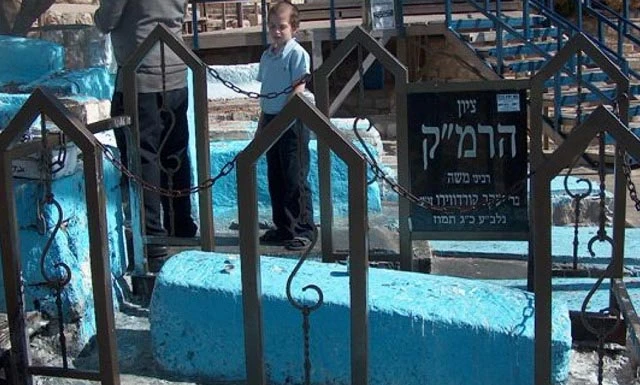Two Women & a Baby: The Wisdom of King Solomon
Uncovering the Subplot Behind the Famous Biblical Story of Shlomo’s Verdict
Class Ki Seitzei/Haftorah Miketz
- August 23, 2015
- |
- 8 Elul 5775
Rabbi YY Jacobson
13421 views- 10Comment
- Call-in
Listen to the class on the phone
Call +1 (845) 201-1933
When prompted, dial the ID number below.
2526 MP3 MP4 Source Sheets - Copy Embed
Leilu Nishmat Reb Eliyahu Tzion ben Reb Chananya Niasoff ז"ל
And in the merit of our partner in Torah Yigal Yisroel ben Sofia שיחיו
Class Summary:
In the very first recorded decision in the history of legal jurisprudence, in the Book of Books (Kings II 3:16), we read about King Solomon's brilliance and how it endeared him at such a tender age to the entire nation of Israel, who willingly accepted him as their monarch.
Two women gave birth, one of the children died. Both women came before King Solomon, each one claiming that their child was the living one. The king decreed the child be cut in half, to which one woman agreed to give up the baby, while the other insisted on the verdict. Solomon rewarded the baby to the first woman. The Tanach says that as a result of this, the entire nation saw the Divine wisdom in the king.
The story is filled with riddles and questions. This fascinating class analysis the thought process behind the king’s decision, the behavior of the two women, one of them obviously lying, and what so impressed the people about this decision. It also explains the story from a psychological and spiritual perspective.
Tags
Categories
Class Ki Seitzei/Haftorah Miketz
Rabbi YY Jacobson
- August 23, 2015
- |
- 8 Elul 5775
- |
- 13421 views
Leilu Nishmat Reb Eliyahu Tzion ben Reb Chananya Niasoff ז"ל
And in the merit of our partner in Torah Yigal Yisroel ben Sofia שיחיו
Related Classes
Please help us continue our work
Sign up to receive latest content by Rabbi YY
Join our WhatsApp Community
Join our WhatsApp Community





Please leave your comment below!
Basya Woonteiler -2 years ago
NOT Kings II. The story is in Kings I.
Melachim I, Perek 3, Pasuk 16.... NOT Melachim II
Reply to this comment.Flag this comment.
John Buchan -3 years ago
a darker, but I think more realistic view of the prostitute who wanted to steal the baby
Rabbi Jacobson, I really enjoyed your reasoning in your video. Unlike most of the paintings of this scene, you perceive, as I do, that Solomon, not the soldier, was holding the sword. May I offer a different idea regarding why the lying prostitute didn't accept the baby when it was offered to her? Because it appeared that the baby would soon die. I think Solomon’s totally unexpected "offer" to kill the baby was a huge relief for her, because it would save her from having to kill the baby herself. I think this situation began when the lying prostitute, realizing she was pregnant, chose to continue as a prostitute (which required her to first give birth, then murder her baby) rather than to live as a single mother in poverty. But the other mother, likely less experienced as a prostitute, appeared to have decided to become an "unemployed" single mother. To dissuade the younger prostitute from leaving the two-prostitute business I think the lying prostitute decided to steal and murder that baby also. Solomon's wisdom enabled him to see through the lying prostitute’s plan. He pretended to "offer" to kill the second baby for her, setting the stage for her, in a highly emotional state, to unintentionally express her true feelings. This rather dark view of prostitution, I think reflects God's deep respect for the sanctity of marriage. How does this sound to you?
Reply to this comment.Flag this comment.
Fred -4 years ago
http://www.shemayisrael.co.il/parsha/kornfeld/archives/miketz.htm Seems to have preceded YY
Reply to this comment.Flag this comment.
Anonymous -4 years ago
That's so ironic, re-listen to the story about 50 minutes and 30 seconds in...
Reply to this comment.Flag this comment.
zev -4 years ago
Can you provide the reference for the Lubavitcher Rebbe's insight on 'splitting the child' not to be meant literally but rather to divide the child's upbringing between the 2 women.
I once heard a chinuch lecture from Rabbi AM Segal where he mentioned this idea in the name of the Rebbe but I am unable to locate it.
Reply to this comment.Flag this comment.
Anonymous -4 years ago
I heard it years ago but I do not know the source. Can you ask Rabbi Segal?
Reply to this comment.Flag this comment.
Nissan Zibell -4 years ago
See this article note 12 similar concept explained in this article, but not as an explanation of the story rather as a lesson to learn from it.
https://www.chabad.org/parshah/article_cdo/aid/3551851/jewish/On-the-Haftarah-Are-You-Cutting-Your-Baby-in-Half.htm
see here for the tshurah http://www.teshura.com/teshurapdf/Wolf%20-%20BM%20-%20Nissan%206%2C%205776.pdf
Reply to this comment.Flag this comment.
Fred -4 years ago
Sefer HaSichos 5750 volume 2 p.594
Reply to this comment.Flag this comment.
Yaacov -5 years ago
Your citation in Tanach is wrong...
It’s Kings I 3:16, not Kings II 3:16.
Reply to this comment.Flag this comment.
Anonymous -7 years ago
what is the story behind the letter at the end of the pdf?
I didn't hear any mention in the shiur of a letter By Justice Scalia? and why did Baruch Cohen write an explanation to him regarding this idea?
Reply to this comment.Flag this comment.
meir -7 years ago
It Took Me an Hour Before I Drowned!
Reply to this comment.Flag this comment.
Cirel -9 years ago
A gute voch
Fascinating class.
Observation: DNA in the time of King David !! See Meam Loez Parshas Ki Saytzay. Page Tof Tof Vov and the mokor that he brings is Mem Vov, Chibur Hamaasiyois.
Interesting, NO? (behashgocho protis I came across it this Shabbos)
Another observation.. Elter Elter Zaide Schwartz lived in a place called OBADOVKA. Zay mevarer where he was Rov. I heard that he went to whatever city u said
Baku to Batum (don’t remember exactly) to be Chazon for Yomim Noiroim. Obadovka was where the Bobbe went summertime-especially- to visit her grandparents.
They were then living in a place called Voznisensk. Kindly let me know when you find out. J
And the blanket story, came to light through you. Neither Avremel nor myself have heard it before. Thank you.
(at least you know someone is listening a bit to your class)
KVT LTU
WWMN
Reply to this comment.Flag this comment.
Boruch Cohen -9 years ago
interesting addendums:
#1: I see a clear link between Shlomo Hamelech's dream and the upcoming custody battle between the two women: When Shlomo Hamelech awakens from his dream, the text concludes that he went (“Va-Yavo”) to Yerushalyim, stood before (“VaYya'amod Lifnei”) the Aron . . . (3:15). In the opening verse of the ensuing narrative, the two prostitutes came (“Va-Tavona”) to the king and stood before him (“Va-Ta'Amodna Lefanav”) (3:16). The parallel wordings bind the two stories together as dream fulfillment.
#2: At the very end of the Netziv's Sefer Emek Sheelah - he writes that the Makor for - Zeh Ne’he’ne V’zeh Lo Chasser – one person benefiting while not causing any loss to the other person - comes from Mishpat Shlomo: Woman #2 was Zeh Ne’he’ne - as she wanted the baby. Woman # 1 was V’zeh Lo Chasser - she didn't care, as she wanted Shlomo Hamelech to kill the baby. Shlomo Hamelech deduced from the Halachic rule of Zeh Ne’he’ne V’zeh Lo Chasser that the woman who wanted the baby #2 was Zeh Ne’he’ne and therefore she got the baby.
#3: Reportedly, in the summer of 2000, at Camp David, Yasser Arafat recited to former President Clinton this classical Biblical story of Mishpat Shlomo, arguing that the very fact that Israel was willing to divide, to compromise and to negotiate on every point, including Jerusalem, while the Arabs were absolutely unyielding and uncompromising, proved that the Israelis were not the true 'mothers'. Not surprisingly, however, Arafat completely missed the point of the story. The issue is not who agrees to cut the baby, but who cares about the baby. It's all about life; the true mother wants the baby to live, while the false mother would gladly see the baby die. The true mother, the Jewish people who love the land, who have a soul connection to the land, who for millennia prayed and continue to pray three times a day, "Please G-d return me to the land," have relinquished their just claim. For the sake of peace, Jews are ready to make painful concessions. Give the baby away rather than hurt the child, they cry out. The most mindless, radical left-wing fanatics, believing in "peace at any price," are ready to sacrifice their very own home, so that the land of Israel will flourish and its inhabitants will live in peace and tranquility.
Reply to this comment.Flag this comment.
chai vekayam -9 years ago
On Sunday morning, I was listening to the live presentation when I lost the
feed just when Rabbi Jacobson mentioned the מדרש פליאה (before he began to
explain it). So i looked at the source sheets specifically the מדרש פליאה and
the one after that- the שו"ע before I heard the Rebbe's explanation.
Before I heard the Rebbe's explanation on Sunday night when I heard the full
recorded version, I came up with my own thoughts in light of Rabbi Jacobson's
discussion 'til that point.
Perhaps the מדרש פליאה means as follows: If Sarah would not have said that she
is Avraham's sister, the following would have occurred: upon seeing Sarah and
her extraordinary beauty, the Mitzriim would present her to the king, and they
would experienced "love ( or more accurately lust) sickness",
overtaken by this חולי אהבה. But there were several choices of how to get rid
of Sarah's husband, either one on the pretext that Avraham attempted to smuggle
someone across the border and perhaps evade taxes. The king could arrest
Avraham and leave him in jail without food until he died - essentially like a
נבלה, (a נבלה usually meaning an animal the dies by itself) - passive
execution. Or the king could have him executed immediately by sword - active
execution.
When Avraham presented his plan to Sarah prior to their descent into Mitzrayim,
Avraham was sure that if they would not say that Sarah was Avraham's sister
then ..." יהרגו אתי ואותך יחיו " , the word " הרג" usually
means swift death by sword. In other words when it comes to extraordinary
circumstance such as love/ lust (of the king to Sarah), [or the Agunah to be
rid of the burden of her baby brother-in-law], the Torah tells us the people
will choose the quicker method of achieving one's goals, despite the worse
moral depravity. [Similarly, if the daughter -in-law would have received the
baby from Shlomo, her baby brother-in-law, she could have done away with him
passively- for example by not feeding him, etc. , but she preferred a swift
solution (Shlomo's sword) to being anchored ( עגונה from the root עוגן -
anchor) as a single "mother" for 13 years.
So this is what the מדרש פליאה means to say: From the story of Avraham , we
learn that ששוחטין (we act swiftly and שחט an animal for the חולה, and we do
not delay until the animal dies by itself and becomes a נבלה, (even though the
animal may be sick and about to die, allowing us to feed the חולה without being
מחלל שבת).
Another thought: Shlomo was the child of בת שבה (whose first husband was sent
away to die ("passively"- not by David's hands) by others’ hands in
war so that David could marry her. Shlomo's brilliant solution to the
first case presented to him as king of these two women perhaps was a spiritual
תיקון for his father's "sin" (and himself as the product of that
marriage) in that by pretending to judge to kill the baby by sword, he
clarified who the real mother was and prevented the daughter -in-law from receiving
the child and killing it passively, as above.
Reply to this comment.Flag this comment.